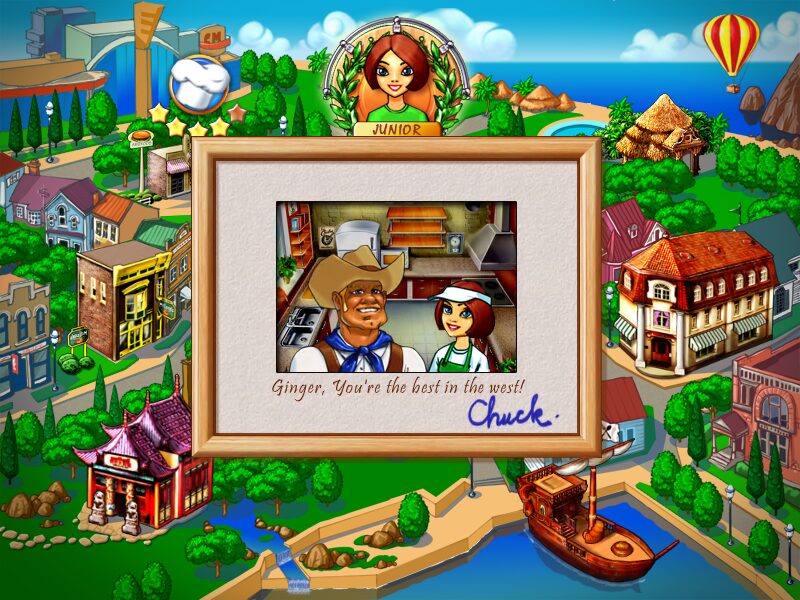Retro Replay Review
Gameplay
Go-Go Gourmet blends time-management mechanics with hidden-object elements to create a fast-paced, engaging experience. As Ginger, you oversee a bustling kitchen where incoming orders appear on the right side of the screen, each listing required ingredients. By clicking on the items spread across the countertop, you assemble dishes and serve them before the clock runs out, racing against both time and customer impatience.
(HEY YOU!! We hope you enjoy! We try not to run ads. So basically, this is a very expensive hobby running this site. Please consider joining us for updates, forums, and more. Network w/ us to make some cash or friends while retro gaming, and you can win some free retro games for posting. Okay, carry on 👍)
Some recipes demand an extra cooking step—grilling, baking or blending—which is indicated by a small appliance icon on the order ticket. While one dish is in the oven, you can switch back to chopping vegetables for a second order, allowing simultaneous multitasking. This juggling act keeps the gameplay fresh, as you learn to prioritize quick dishes versus more complex orders.
Patience meters above each customer portrait change color from green to red, so keen observation is vital. Angry customers will storm out, hurting your profits, while satisfied diners tip more generously. Achieving bronze, silver, or gold medals requires not only meeting profit targets but also serving dishes accurately and swiftly.
Between levels, you invest your earnings into restaurant renovations—unlocking new kitchen layouts and decorative items that grant special bonuses. Periodic bonus stages challenge you to find every ingredient listed in a notebook against the clock, with a rechargeable hint button lending occasional guidance. These varied objectives and upgrade paths ensure a steady sense of progression.
Graphics
The visual style of Go-Go Gourmet is bright and cartoonish, with a colorful palette that immediately sets a cheerful tone. Each restaurant theme—be it a seaside bistro or a traditional street market—features unique backdrops and custom ingredient art. The attention to detail in plates, utensils, and décor elements makes the kitchens feel lived-in and authentic.
Ingredient icons are crisp and easy to distinguish, which is crucial given the rapid pace of orders. The UI is clean: orders stack neatly on the right, a clock sits unobtrusively at the top, and your tray at the bottom serves as a clear serving point. Even on smaller screens, text and icons remain legible, reducing friction during intense moments.
Animations breathe life into the kitchen—flames flicker on the stove, dough rises in the oven, and customers animate happily when they receive their meals. Minor touches, like steam rising from a freshly cooked dish or animated facial expressions, heighten satisfaction and reward efficient service.
Performance is consistently smooth across desktops and tablets, with almost no noticeable loading times between levels. The game scales well to different resolutions, and hardware requirements remain modest, making it accessible to a broad audience without sacrificing visual flair.
Story
Go-Go Gourmet centers on Henry, a seasoned globetrotting cook who leaves his niece, Ginger, in charge of the family restaurant. Henry’s quest to collect recipes from around the world sets the stage, as Ginger must prove her culinary chops to keep the restaurant thriving in his absence. This familial dynamic gives the game a warm, motivating backdrop.
Each new location in Henry’s journey unlocks themed menus and exotic ingredients for Ginger to learn. From tropical fruits to ornate spices, you gradually fill a digital cookbook with dishes drawn from Henry’s travels. The narrative unfolds through brief cutscenes and diary entries, offering context to each level without bogging down the gameplay.
Customers themselves feel like minor characters in Ginger’s adventure, each portrait hinting at a unique personality—from the eager food critic to the speedy businessman grabbing lunch. Special prizes awarded for consistent speed and accuracy sometimes trigger lighthearted dialogue, reinforcing the connection between performance and story progression.
While the overarching storyline remains straightforward, it serves its purpose: to motivate level advancement and ingredient collection. The blend of personal stakes (proving Ginger’s skills) and the promise of global recipes keeps players invested in seeing Henry return to a revamped, flourishing restaurant.
Overall Experience
Go-Go Gourmet delivers a satisfying mix of strategy, speed, and discovery that will appeal to both casual gamers and time-management enthusiasts. The steady ramp-up in difficulty ensures you’re always challenged without feeling overwhelmed, and the hidden-object twist adds a layer of visual puzzle-solving to the standard cooking craze formula.
Replayability is high thanks to the medal system: chasing gold on every level demands pinpoint efficiency and memorization of recipe patterns. Bonus stages and restaurant upgrades inject variety, while the hint mechanic offers a safety net for less experienced players, keeping frustration at bay.
The game’s charm lies in its polished presentation—engaging visuals, tight controls and a lighthearted storyline that encourages you to unlock every recipe Henry has collected. Whether you have five minutes or an hour to spare, Go-Go Gourmet offers bite-sized thrills and a clear sense of accomplishment.
Overall, Go-Go Gourmet is a delectable time-management treat that balances fast-paced service with casual exploration. Its bright graphics, intuitive interface and global culinary theme make it a standout choice for anyone seeking a spirited, family-friendly challenge in the kitchen.
 Retro Replay Retro Replay gaming reviews, news, emulation, geek stuff and more!
Retro Replay Retro Replay gaming reviews, news, emulation, geek stuff and more!









Reviews
There are no reviews yet.